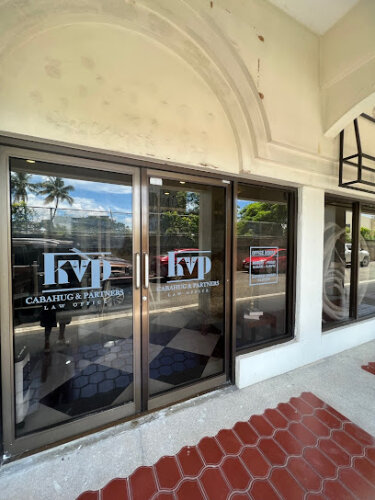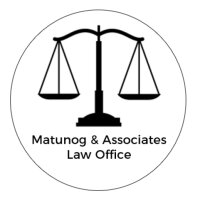Best Arrests & Searches Lawyers in Philippines
Share your needs with us, get contacted by law firms.
Free. Takes 2 min.
Or refine your search by selecting a city:
List of the best lawyers in Philippines

Dagsaan Monterde Castillo Law and Notary Public (DMC LAW)
15 minutes Free ConsultationAbout Arrests & Searches Law in Philippines
In the Philippines, the law governing arrests and searches is primarily derived from the Constitution and the Revised Penal Code. Arrests are defined as the act of taking a person into custody in order for them to be brought to court to answer a charge. Searches, on the other hand, pertain to the examination of a person's property or premises to find evidence of a crime. The rights of individuals against unreasonable searches and seizures are protected under Article III, Section 2 of the Philippine Constitution. These laws aim to balance the enforcement of laws and the protection of individual rights against abuses and arbitrary actions by authorities.
Why You May Need a Lawyer
There are several situations in which you might need legal assistance related to arrests and searches in the Philippines:
- If you are being investigated or have been charged with a crime, navigating the legal system without professional guidance can be challenging.
- If you believe your rights were violated through an unlawful arrest or search, a lawyer can help you understand your options and pursue remedy.
- Legal representation is crucial if you are detained, as a lawyer can work to protect your rights and seek your release.
- Complex laws and procedures can be difficult for the layperson to grasp, making legal advice critical for ensuring your defense is properly articulated.
Local Laws Overview
Key aspects of local laws relevant to arrests and searches in the Philippines include:
- Arrest: An arrest without a warrant can only be made under specific circumstances, such as when a person is caught in the act of committing a crime, or there is probable cause to believe a person has just committed a crime.
- Search Warrant: For a search to be lawful, a warrant must generally be obtained, describing particularly the place to be searched and the items to be seized. Exceptions to this requirement exist, such as in cases of "stop and frisk" or when consent is given.
- Rights of the Accused: Article III of the 1987 Constitution outlines several rights for the accused, including the right to due process, the right against self-incrimination, and the right to be informed of the nature and cause of the accusation against them.
Frequently Asked Questions
What constitutes a legal arrest in the Philippines?
An arrest is deemed legal if it's performed with a warrant, unless it falls under exceptions such as being caught in the act or with probable cause.
What can I do if I believe I've been unlawfully arrested?
If you believe your arrest was unlawful, you can challenge the legality of your arrest through legal representation and possibly file a complaint against the arresting officers.
What are my rights if I am detained?
You have the right to be informed of why you are detained, the right to remain silent, and to have competent and independent counsel preferably of your choice.
Can the police search my house without a warrant?
Generally, the police need a warrant to conduct a search unless it's a lawful arrest, consent is given, or there's an emergency circumstance.
What is a warrantless arrest?
This occurs when an arrest is made without a warrant under specific circumstances, such as catching a person in the act of committing a crime.
How do I obtain a lawyer in the Philippines?
You can contact the Integrated Bar of the Philippines or seek referral services from legal aid organizations for assistance in finding a lawyer.
What is probable cause for an arrest?
Probable cause refers to a reasonable ground of suspicion, supported by circumstances strong enough to warrant a cautious person's belief that the person to be arrested is guilty of a crime.
What happens if evidence is obtained through an illegal search?
Evidence obtained through an illegal search may be inadmissible in court under the "fruit of the poisonous tree" doctrine.
Are there any protections against police abuse during a search or arrest?
You are protected by law from unreasonable searches and illegal arrests. Any abuses can be addressed through legal remedies and actions against the responsible parties.
What should I do immediately after an arrest in the Philippines?
Affirm your right to a lawyer, remain silent until your lawyer is present, and comply with legal processes while ensuring your constitutional rights are upheld.
Additional Resources
For further assistance and information regarding legal advice on arrests and searches in the Philippines, consider reaching out to:
- Integrated Bar of the Philippines: Provides a directory for finding legal assistance.
- Commission on Human Rights: Offers assistance regarding human rights violations.
- Public Attorney's Office: Provides free legal assistance to indigent individuals.
Next Steps
If you require legal assistance for issues regarding arrests and searches, consider taking the following steps:
- Consult a Lawyer: Seek the guidance of an experienced lawyer familiar with Filipino law on arrests and searches.
- Gather Evidence: Document any evidence of rights violations or improper procedure to aid your case.
- Understand Your Rights: Educate yourself on the legal rights afforded to you by the Constitution and ensure these are respected.
- Reach Out for Help: Utilize available resources and organizations for support and guidance.
Lawzana helps you find the best lawyers and law firms in Philippines through a curated and pre-screened list of qualified legal professionals. Our platform offers rankings and detailed profiles of attorneys and law firms, allowing you to compare based on practice areas, including Arrests & Searches, experience, and client feedback.
Each profile includes a description of the firm's areas of practice, client reviews, team members and partners, year of establishment, spoken languages, office locations, contact information, social media presence, and any published articles or resources. Most firms on our platform speak English and are experienced in both local and international legal matters.
Get a quote from top-rated law firms in Philippines — quickly, securely, and without unnecessary hassle.
Disclaimer:
The information provided on this page is for general informational purposes only and does not constitute legal advice. While we strive to ensure the accuracy and relevance of the content, legal information may change over time, and interpretations of the law can vary. You should always consult with a qualified legal professional for advice specific to your situation.
We disclaim all liability for actions taken or not taken based on the content of this page. If you believe any information is incorrect or outdated, please contact us, and we will review and update it where appropriate.
Browse arrests & searches law firms by city in Philippines
Refine your search by selecting a city.
















